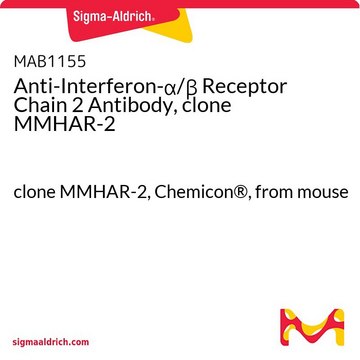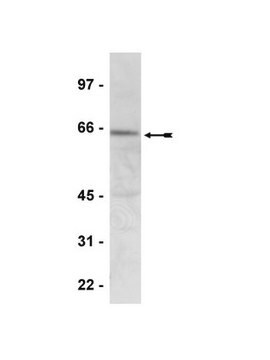MAB2162
Anti-Adrenoleukodystrophy Protein Antibody, a.a. 495-648, clone 1AL-2B4
ascites fluid, clone 1AL-2B4, Chemicon®
Synonym(s):
ALDP
About This Item
ICC
IHC
WB
immunocytochemistry: suitable
immunohistochemistry: suitable
western blot: suitable
Recommended Products
biological source
mouse
Quality Level
antibody form
ascites fluid
antibody product type
primary antibodies
clone
1AL-2B4, monoclonal
species reactivity
human
manufacturer/tradename
Chemicon®
technique(s)
ELISA: suitable
immunocytochemistry: suitable
immunohistochemistry: suitable
western blot: suitable
isotype
IgG1
NCBI accession no.
UniProt accession no.
shipped in
dry ice
target post-translational modification
unmodified
Gene Information
human ... ABCD1(215)
Specificity
Immunogen
Application
Western blot: 1:500-1:5,000
Immunohistochemistry: 1:500-1:5,000
Immunocytochemistry: 1:500-1:5,000
Optimal working dilutions must be determined by the end user.
Neuroscience
Neurodegenerative Diseases
Physical form
Storage and Stability
Important Note: During shipment, small volumes of product will occasionally become entrapped in the seal of the product vial. For products with volumes of 200 μl or less, we recommend gently tapping the vial on a hard surface or briefly centrifuging the vial in a tabletop centrifuge to dislodge any liquid in the container′s cap.
Legal Information
Disclaimer
Not finding the right product?
Try our Product Selector Tool.
Storage Class Code
10 - Combustible liquids
WGK
nwg
Flash Point(F)
Not applicable
Flash Point(C)
Not applicable
Certificates of Analysis (COA)
Search for Certificates of Analysis (COA) by entering the products Lot/Batch Number. Lot and Batch Numbers can be found on a product’s label following the words ‘Lot’ or ‘Batch’.
Already Own This Product?
Find documentation for the products that you have recently purchased in the Document Library.
Our team of scientists has experience in all areas of research including Life Science, Material Science, Chemical Synthesis, Chromatography, Analytical and many others.
Contact Technical Service








